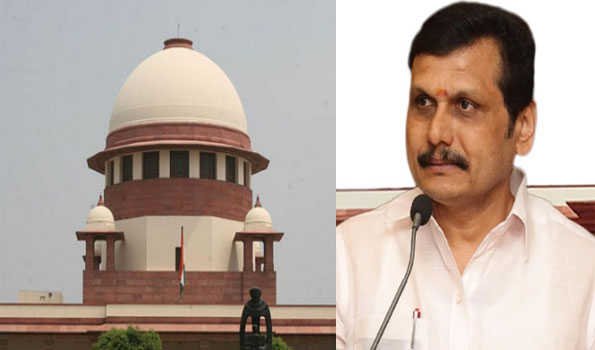The recent Supreme Court hearing involving Tamil Nadu Minister Senthil Balaji has brought to light several pressing legal and moral questions. The debate centers on the Supreme Court’s observations regarding Balaji’s reinstatement to ministerial office following his release on bail. This blog explores the intricate legal, political, and ethical dimensions of the case, based on the transcript of the hearing and broader contextual analysis.
Case Overview
Senthil Balaji, a senior Tamil Nadu minister handling critical portfolios like electricity, prohibition, and excise, has been embroiled in a money laundering case. Arrested by the Enforcement Directorate (ED), Balaji spent over 400 days in custody before being granted bail in September 2024. His immediate reinstatement as a minister by Tamil Nadu Chief Minister MK Stalin raised eyebrows, leading the Supreme Court to pose sharp questions about the propriety of such a decision.
The Supreme Court’s Key Observations
During the hearing, Justice Abhay S. Oka highlighted a crucial concern:
“We grant bail, and the next day, you go and become a minister. Anybody will be bound to be under the impression that now with your position as a senior cabinet minister, witnesses will be under pressure. What is going on?”
This pointed remark encapsulates the judiciary’s apprehensions about the implications of Balaji’s reinstatement. The Supreme Court did not recall the bail judgment but scheduled further hearings for December 13, 2024, leaving the matter open for continued scrutiny.
The Legal Questions at Hand
- Can a Minister Facing Serious Charges Be Reinstated? The Constitution does not explicitly bar individuals facing criminal charges from holding public office. However, Article 164(1) of the Constitution gives the Chief Minister discretion in selecting cabinet members, subject to the Governor’s approval.Critics argue that appointing a minister under investigation undermines public confidence and raises ethical concerns about governance.
- Presumption of Innocence vs. Public Perception Balaji’s supporters, including DMK analysts, argue that the presumption of innocence—a fundamental legal principle—applies until proven guilty. However, detractors emphasize the need for higher ethical standards for public officials, particularly those wielding significant influence.
- Potential Witness Tampering The judiciary’s concern about Balaji’s potential to influence witnesses is not unfounded. As a senior minister with access to resources and authority, his position could be perceived as intimidating to witnesses, potentially impacting the integrity of the judicial process.
Political Implications
DMK’s Stand
The DMK government, led by MK Stalin, has staunchly defended Balaji, portraying the case as a politically motivated vendetta by the central government. This narrative seeks to rally support by framing the Enforcement Directorate’s actions as biased and targeting regional parties opposed to the Bharatiya Janata Party (BJP).
Opposition Criticism
Opposition parties, including the BJP, have criticized Balaji’s reinstatement. Narayan Tirupati, a BJP leader, remarked that Balaji’s continued presence in the cabinet sends a troubling signal, particularly when serious allegations like bribery and extortion have been levied against him.
Ethical Considerations in Governance
Moral Responsibility of Public Officials
The Supreme Court’s observations bring to the fore the declining ethical standards in politics. In earlier times, ministers facing allegations would voluntarily step down until cleared of charges. This practice, rooted in maintaining public trust, appears to have eroded over time.
Public Perception and Trust
Balaji’s reinstatement risks creating a perception that political leaders are above the law. This perception can erode public confidence in democratic institutions and the rule of law.
Balaji’s Political Importance
Despite being a relatively new entrant to the DMK, Balaji is considered a powerful figure in Tamil Nadu politics, particularly in the western region. Political analysts like Suman S. Raman suggest that his control over lucrative portfolios such as electricity and prohibition underscores his importance to the party.
Additionally, Balaji is believed to play a significant role in fundraising for the DMK, making him indispensable in the lead-up to the 2026 Tamil Nadu Assembly elections. This financial influence may explain the DMK’s unwavering support for him, despite the controversies.
Legal Precedents and Comparisons
- Historical Cases Balaji’s case is not unprecedented. Political leaders across parties have faced criminal charges while holding public office. However, the immediate reinstatement of a minister post-bail is rare and raises unique concerns.
- Supreme Court Guidelines The Supreme Court has previously emphasized the need for candidates with clean records in electoral politics. In its landmark Lily Thomas vs Union of India judgment, the Court disqualified convicted legislators, reinforcing the importance of integrity in public life.
Counterarguments by Balaji’s Supporters
Presumption of Innocence
Balaji’s advocates argue that the ED has failed to file a convincing charge sheet, casting doubt on the strength of the case against him. They assert that his reinstatement is a constitutional prerogative of the Chief Minister.
Selective Targeting
The DMK has accused the BJP of using central agencies to target opposition leaders selectively. This accusation aligns with broader criticisms of the misuse of investigative agencies for political gains.
Supreme Court’s Role in Balaji’s Case
The judiciary’s intervention highlights its critical role in upholding the rule of law. While the Court refrained from recalling Balaji’s bail, its pointed questions reflect broader concerns about governance, ethics, and public perception.
The upcoming December 13 hearing will likely delve deeper into these issues, offering an opportunity for the judiciary to set new benchmarks for ethical governance.
Conclusion: A Crossroads for Indian Politics and Law
The Senthil Balaji case is more than a legal battle; it is a litmus test for Indian democracy’s commitment to accountability and transparency. As the Supreme Court navigates this complex case, its decisions will have far-reaching implications for governance, public trust, and the role of the judiciary in addressing ethical lapses in politics.
Balaji’s reinstatement, while legally permissible, has sparked a larger debate about the intersection of law, ethics, and political expediency. The resolution of this case will likely shape future discourse on ministerial accountability in India, offering valuable lessons for policymakers, legal practitioners, and citizens alike.







